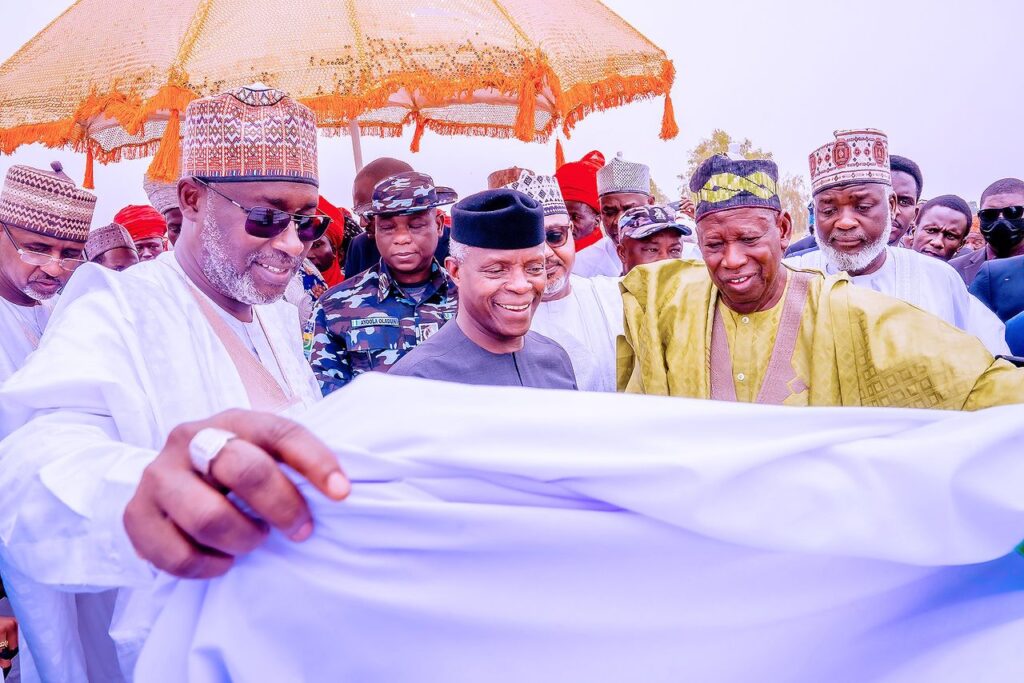A multi-billion-naira irrigation scheme has been inaugurated in Kano State. The project is designed to transform the condition of farming communities along the Kano River Basin. The Vice President of Nigeria, Prof. Yemi Osinbajo (SAN), who recently inaugurated the project, said that the Kano River Irrigation Scheme (KRIS) would touch at least, one million lives. The project was executed by the Federal Ministry of Water Resources through the Transforming Irrigation Management in Nigeria (TRIMING) Project, in collaboration with the World Bank on the implementation of TRIMING.
Speaking at the commissioning of the scheme in the Bunkure Local Government Area of Kano State, the Vice President said, the project was an innovative approach adopted by the Federal Government, which had opened access to life-changing opportunities for the farming communities that are involved in it. “The project is an innovative approach adopted by the Federal Government, which has opened access to life-changing opportunities for the farming communities that are involved. It also serves as a vehicle to effectively harness the potential of vast water resources infrastructure, some of which were built well over 40 years ago, but largely remained either unutilised or grossly under-utilised.
“The main beneficiaries of the project include basin stakeholders, irrigation and drainage entities, water users’ associations, farmers, and rural dwellers in the project areas. Through the direct infrastructure investments covering about 37,500 hectares across six states, concurrent activities in agriculture and on-farm water management in these areas, approximately 140,000 farm families with about one million people are directly benefiting”, he said. The N27 billion World Bank-assisted Kano River Irrigation Scheme (KRIS) was designed to enhance the productivity of farmers through irrigation of 144,444 hectares for farmers and other one million beneficiaries directly. He said: “Irrigation Project in Nigeria is an innovative approach adopted by the Federal Government which has opened-up the access to life changing opportunities for many of the families in the communities that are involved in the project”.
According to the Vice President, the project is one of the success stories of the Federal Government, even as he acknowledged efforts of the first Governor of Kano State, Audu Bako, who initiated the project over 40 years ago that eventually came to be known as Kano River Irrigation Scheme (KRIS). The Minister of Water Resources, Engr. Suleiman Adamu corroborated that the project was “part of the intervention programme embarked upon by the Federal Government of Nigeria, through the World Bank supported by Transforming Irrigation Management in Nigeria (TRIMING) Project to enhance the food production drive of the country. In realising government’s efforts to address the nation’s food security drive, transformative changes are required which brought about the need for the Transformation Irrigation Management in Nigeria.
Adamu called on the beneficiary communities and Government of Kano State to own the project and ensure its sustainability, “Let me use this opportunity to call on all of us present here, including those that were not able to attend this function that our unflinching support is critical for the success of this scheme, and all the other TRIMING Project schemes. I would like to use this opportunity, to request for the kind attention of the government of Kano State, among the TRIMING Project beneficiary communities, to kindly take this intervention as their personal endeavour to ensure its critical success”, he said.
The Governor of Kano State, Abdullahi Ganduje, hailed the Federal Government for commissioning the Kano River Irrigation Scheme (KRIS), saying the project had further improved the agriculture potentials of the state to an enviable level. Ganduje acknowledged that the Buhari-led administration had contributed tremendously to the improvement of lives of Kano people, being the commercial hub of Nigeria. The Vice President thanked the Governor for his tenacity and collaboration with the Federal Ministry of Water Resources, comprising the Minister and his team, which ensured that the project was fully completed.



